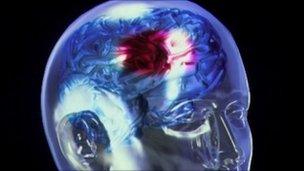'Faster care' for stroke victims across health boards
- Published

Immediate specialist treatment is the priority for stroke victims
People who suffer a mini-stroke will receive specialist treatment within 24 hours, under new plans for Wales.
Patients who have a mini-stroke, called a Transient Ischaemic Attack (TIA), have a 20% chance of a full stroke within four weeks if they receive no medical treatment.
TIA services will be available in every district general hospital by next year.
But Dr Tony Rudd, a leading stroke expert, says despite some progress, stroke care in Wales is still lacking.
About 11,500 people in Wales suffer a stroke or TIA each year and medical professionals say quick treatment means a better outcome and recovery for the patient. Approximately 11% of all deaths in the UK are caused by strokes.
Under the plans, access to a clot-busting drug, thrombolysis, currently offered only during weekday office hours will be expanded to 24 hours a day, every day, across all of Wales by 2011.
The drug is given to patients who suffer certain types of stroke and can limit the long term brain damage. However, to be effective it has to be carried out within three hours of the stroke happening.
Announced on World Stroke Awareness Day, health boards will from next year will offer "specialist assessment, preventative treatment and lifestyle advice in a single hospital visit".
Welsh Assembly Government clinical lead for stroke, Dr Anne Freeman, said: "Stroke is a preventable and treatable disease but urgency is needed in both recognising the symptoms and getting to hospital for specialist assessment and treatment. This is the key to reducing death and disability.
"With clear leadership, more investment, and greater coordination of services, NHS Wales is working to continually improve the outcomes for all stroke patients across the country, as well as to improve prevention of stroke."
But Wales continues to lag behind the rest of the UK in terms of stroke care provision, according to a national audit of hospitals (PDF), external carried out earlier this year.
In Wales there are 2.9 qualified nurses per 10 stroke beds, compared to an average of 3.2 in all areas.
An average of 23% of all sites has staff in place for stroke specialist training, compared to 7% in Wales.
Dr Tony Rudd, stroke provision director for the Royal College of Physicians, said services in Wales still needed improvement.
Drr Rudd said: "Wales is coming from quite a long way back compared to England and other parts of Europe.
"The last audit report of Wales stroke care provision still showed there were some significant problems for paients to get access to care."
He said there was a lack of access to stroke units, to medical imaging, and to thrombolysis.
"We recognise that there are geographical problems but saying it is difficult is not good enough," he said.
Access to thrombolysis on a 24-hour basis was important, he said, but he cautioned it was important there was sufficient training for its use.
"Thrombolysis is dangerous is administered to the wrong people in the wrong way. Thrombolysis is only really effective for 10 to 15% of patients.
"Lots of work needs to be done in Wales to get basic care right. Many units are not quite ready to be administering thrombolysis."
He added: "Getting access to stroke units is far more important than access to thrombolysis."
Dr Rudd said Wales had made progress in some areas, adding: "It's very encouraging there is now a strategy in place."
'Transformed recovery'
Pat Harris, one of the first patients in Aneurin Bevan Health Board in south east Wales to receive thrombolysis after suffering a stroke, said it had transformed her recovery.
Mrs Harris, 72, from Goldcliff, Newport, arrived at the Royal Gwent Hospital quickly enough to benefit from the treatment.
She said: "When I had my stroke I couldn't speak, my left side was bad, my hand and leg, but the treatment has been fantastic.
"Following the clot-busting drugs, physiotherapy started straightway. My speech came back quickly and I'm getting stronger every day."
NHS Wales medical director Dr Chris Jones said: "By providing specialist treatment within 24 hours we can make a huge difference to the patient outcome and improving support to individuals following stroke can also help them achieve optimal recovery.
"The introduction of thrombolysis is already making a big difference and work is continuing to ensure we can provide the treatment 24/7 across Wales as soon as possible."
- Published19 August 2010